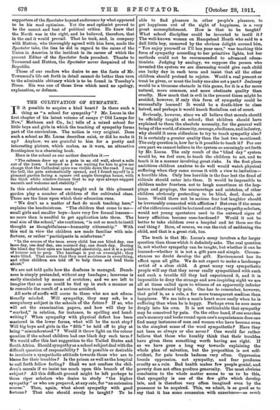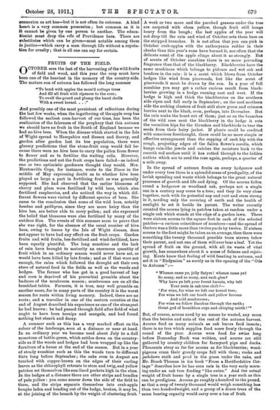THE CULTIVATION OF SYMPATHY.
IS it possible to acquire a kind heart P Is there such a thing as " a school for sympathy " P Mr. Lucas in the first chapter of his latest volume of essays (" Old Lamps for New," Methuen and Co., 5s.) tells of a mixed school for little boys and girls in which the teaching of sympathy forms part of the curriculum. The notion is very original. Does such a school as Mr. Lucas describes exist, or did he make it up P Anyhow, we are grateful to him for a pretty and interesting picture, which makes, as it were, an attractive
frontispiece to a charming book.
Here is the school as our author describes it :-
" The cabman drew up at a gate in an old wall, about a mile out of the town. I noticed as I was waiting for him to give me change that the Cathedral spire was visible down the road. I rang the bell, the gate automatically opened, and I found myself in a pleasant garden facing a square red ample Georgian house, with the thick white window-frames that to my eyes always suggest warmth and welcome and stability."
In this substantial house are taught and in this pleasant garden play a number of children of the cultivated class.
These are the lines upon which their education runs.
" We don't as a matter of fact do much teaching here," explains the headmistress. "The children that come to me—
small girls and smaller boys—have very few formal lessons— no more than is needful to get application into them. The real aim of the school," she continues, "is not so much to instil thought as thoughtfulness—humanity citizenship." With this end in view the children are made familiar with mis- fortune, or rather "participants in misfortune."
" In the course of the term every child has one blind day, one lame day, one deaf day, one maimed day, one dumb day. During the blind day their eyes are bandaged absolutely, and it is a point of honour not to peep. The bandage is put on overnight; they wake blind. That means that they need assistance in everything, and other children are told off to help them and lead them about."
We are not told quite how the deafness is managed. Dumb- ness is simply pretended, without any bandages ; lameness is easily simulated by means of crutches ; and we are left to imagine that an arm could be tied up in such a manner as to resemble the result of a serious accident.
All sorts of scoffs will occur to those who are not educa- tionally minded. Will sympathy, they may ask, be a compulsory subject in the schools of the future P If so, who will set the examination papers, and how will they be "marked," in relation, for instance, to spelling and hand- writing P When sympathy with physical defect has been mastered in the lower forms, what will be the next step P Will big boys and girls in the " fifth " be told off to play at being " misunderstood" P Would it throw light on the colour question if the school children had one black day each term P We would offer this last suggestion to the United States and South Africa. Should sympathy as a school subject deal with the difficult question of responsibility P Is it possible or desirable to inculcate a sympathetic attitude towards those who are to blame for their troubles ? Is the prison as well as the hospital to call forth fellow feeling? Shall we not confuse the chil- dren's morals if we insist too much upon this branch of the subject? All this difficult ground might be left perhaps to those riper scholars who desire to study "the higher sympathy " or who are prepared, at any rate, for "an extension course." Then, again, what about sympathy with good fortune P That also should surely be taught P To be
able to find pleasure in other people's pleasure, to get happiness out of the sight of happiness, is a very great accomplishment. How is that to be taught? What school discipline could be invented to instil it P The well-known woman on Hampstead Heath who said to a dull little boy, unmoved by the obvious delight around him, " You enjoy yourself or I'll box your ears," was teaching this form of sympathy according to her primitive lights, but her methods could not be recommended to advanced educa- tionists. Judging by analogy, we suppose the person who invented the system we are discussing would give each child one lucky day in each term and insist that all the other children should pretend to rejoice. Would a real present or treat be given, or must the lucky one also act a part P Jealousy would be a tiresome obstacle in this game, for it is a far more natural, more common, and more obstinate quality than cruelty. How much that is evil in the present times might be avoided, however, if only this form of sympathy could be successfully learned! It would be a death-blow to class hatred, and perhaps it would knock Socialism out of court.
Seriously, however, since we all believe that morals should be officially taught at school; that children should have explained to them the absolute necessity, for the general well being of the world, of sincerity, courage, obedience, and industry, why should it seem ridiculous to try to teach sympathy also? It is certainly a greater quality than the last two mentioned. The only question is, how far is it possible to teach it ? For our own part we cannot believe in the system so amusingly set forth by Mr. Lucas. The only result of the "blind day" system would be, we feel sure, to teach the children to act, and to teach it in a manner involving great risks. In the first place ambitious children anxious to do well would watch physical suffering when they came across it with a view to imitation-- a horrible idea. Only less horrible is the fear lest the fiend of ridicule should enter into them. It would be impossible to children under fourteen not to laugh sometimes at the hop- pings and gropings, the murmurings and mistakes, of other children obviously pretending to be blind, deaf, dumb, or lame. Would there not be serious fear lest laughter should be irrevocably connected with affliction P But even if the sense of the ridiculous could be lectured out of the sympathy scholars, would not young spectators used to the outward signs of heavy affliction become case-hardened P Would it not be better to take children over a hospital and let them see the real thing ? Here, of course, we run the risk of saddening the child, and that is a great risk, too.
The truth is that Mr. Lucas's essay involves a far larger question than those which it definitely asks. The real question is, not whether sympathy can be taught, but whether it can be learned—whether it is not a gift pure and simple. Circum- stances no doubt develop the gift. Environment has its effect upon all gifts. We do not expect to make a landscape artist of a slum child. A great many very sympathetic people will say that they never really sympathized with such and such a trouble till they had experienced it, and it is impossible to deny the strange and awe-inspiring sight we are all at times called upon to witness of an apparently inferior nature transformed by pain. One has to remember, however, that grief is, as a rule, a far more transparent medium than happiness. We see into a man's heart more easily when he is suffering than when he is happy. Perhaps even he sees more deeply into his own. It is not unthinkable that sympathy may be conceived by pain. On the other hand, if one searches one's memory and looks round upon one's acquaintance does one find many instances of men and women who have become even in the simplest sense of the word sympathetic? Have they not been so always or else never ? One would far rather believe that those who humbly think that their troubles have given them something worth having are right. If so we have gone a long way towards explaining the whole plan of salvation, but the proposition is not self- evident, for pain breeds badness very often. Oppression breeds oppression, not sympathy, and fear produces cruelty as a rule. Bad health makes few people genial, and poverty does not often produce generosity. The most obvious conclusion to the whole matter seems to us to be this, that sympathy is one of the few gifts which develop late, and is therefore very often imagined even by the possessor to be acquired. This, we admit, is as good as to say that it has some connexion with exnerience—as much
connexion as art has—but it is not often its outcome. A kind heart is a very common possession ; but common as it is it cannot be given by one person to another. The educa- tionist must drop the role of Providence here. There are smhstitutes which can be given—most notable among them is justice—which carry a man through life without a reputa- tion for cruelty; that is all one can say for certain.











































 Previous page
Previous page